Trump meets Syria’s former-insurgent-turned-leader in Saudi Arabia
Ahmad al-Sharaa spent years imprisoned by US forces after being captured in Iraq.

US President Donald Trump has met interim Syrian president Ahmad al-Sharaa in Saudi Arabia, the first encounter between the two nations’ leaders in 25 years and one that could mark a turning point for Syria as it struggles to emerge from decades of international isolation.
The meeting, on the sidelines of Mr Trump’s get-together with the leaders of the Gulf Co-operation Council (GCC), marks a major turn of events for a Syria still adjusting to life after the more than 50-year, iron-gripped rule of the Assad family.
Mr Trump praised Mr al-Sharaa when speaking to reporters after the meeting on Air Force One, saying he was a “young, attractive guy. Tough guy. Strong past. Very strong past. Fighter”.
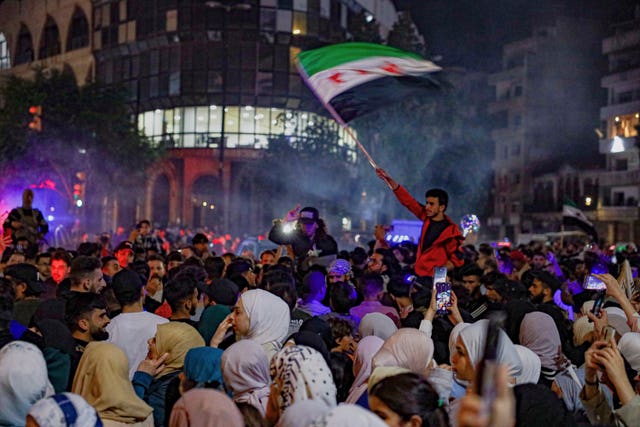
Under the nom de guerre Abu Mohammed al-Golani, Mr al-Sharaa had ties to al Qaida and joined insurgents battling US forces in Iraq before entering the Syrian war.
He was even imprisoned by US troops there for several years.
“He’s got a real shot at holding it together,” Mr Trump said.
“He’s a real leader. He led a charge and he’s pretty amazing.”
The US president had announced the day before as he kicked off his three-nation Middle East tour in Riyadh that he would also move to lift US sanctions imposed on Syria under the deposed autocrat Bashar Assad.
People across Syria cheered in the streets and set off fireworks on Tuesday night to celebrate, hopeful their nation – locked out of credit cards and global finance – might rejoin the world’s economy when they need investments the most.
The meeting came even after Israeli Prime Minister Benjamin Netanyahu had earlier asked Mr Trump not to lift sanctions on Syria, again underscoring a growing discontent between the White House and the Israeli government as its war on Hamas in the Gaza Strip rages on.
I am “ordering the cessation of sanctions against Syria to give them a fresh start”, Mr Trump told the GCC after his meeting with Mr al-Sharaa.
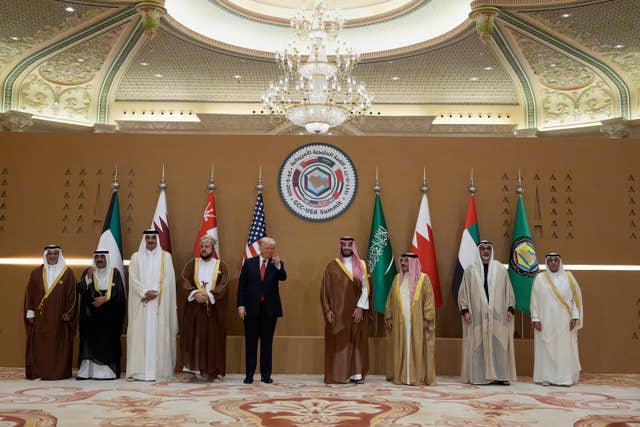
“It gives them a chance for greatness. The sanctions were really crippling, very powerful.”
Mr Trump said Mr al-Sharaa had agreed to join the Abraham Accords and recognise Israel at some point, telling reporters: “I think they have to get themselves straightened up. I told him, ‘I hope you’re going to join when it’s straightened out.’ He said, ‘Yes.’ But they have a lot of work to do.”
Mr Trump said on Tuesday that he would meet Mr al-Sharaa, who had flown in to the Saudi capital for the face-to-face meeting.
Even before its ruinous civil war that began in 2011, Syria struggled under a tightly controlled socialist economy and under sanctions by the US as a state-sponsor of terror since 1979.
The Trump-al-Sharaa meeting took place behind closed doors and reporters were not permitted to witness the engagement.
The White House later said it ran for just over 30 minutes, making Mr al-Sharaa the first Syrian leader to meet an American president since Hafez Assad met Bill Clinton in Geneva in 2000.
Turkish President Recep Tayyip Erdogan joined the meeting between Mr Trump, Saudi Crown Prince Mohammed bin Salman and Mr al-Sharaa via a phone call.
Turkey was a main backer to Mr al-Sharaa and his rebel faction.
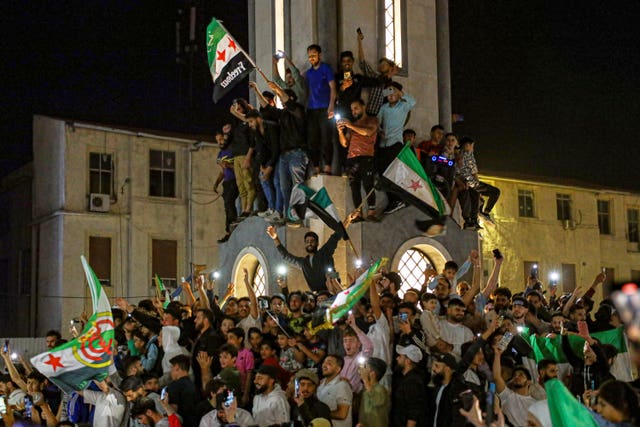
“I felt very strongly that this would give them a chance,” Mr Trump said of Syria.
“It’s not going to be easy anyway, so gives them a good strong chance. And it was my honour to do so.”
He added: “We made a speech last night and that was the thing that got the biggest applause from the room.”
Mr Trump cited the intervention of Saudi Prince Mohammed as key to his decision.
“We commend the decision made yesterday by President Trump to lift the sanctions on the brotherly Syrian Arab Republic, which will alleviate the suffering of the Syrian people,” he said in a speech to the GCC.
White House press secretary Karoline Leavitt said in a statement that Mr Trump urged Mr al-Sharaa to diplomatically recognise Israel, “tell all foreign terrorists to leave Syria” and help the US stop any resurgence of the so-called Islamic State group.
Mr Trump also asked for the Syrian government to “assume responsibility” for more than a dozen detention centres holding some 9,000 suspected members of IS, Ms Leavitt added.
The prisons are run by the US-backed and Kurdish-led forces that spearheaded the military campaign against the extremists and controlled the last sliver of land they once held in March 2019.
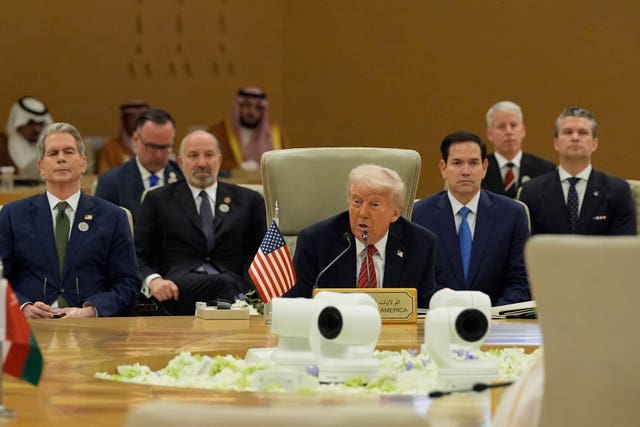
As part of a deal reached in March between the Syrian government and the Kurdish-led forces, all border crossings with Iraq and Turkey, airports and oil fields in the north east would be brought under the central government’s control by the end of the year.
Mr Trump’s desire for Syria to take over the prisons also signals the potential of a full American military withdrawal from Syria.
Syria’s Foreign Ministry said Mr Trump and Mr al-Sharaa discussed the Syrian-US partnership in fighting terror and armed groups such as IS standing in the way of stability.
Mr al-Sharaa was named interim president of Syria in January, a month after a stunning offensive by insurgent groups led by Mr al-Sharaa’s Hayat Tahrir al-Sham (HTS) that stormed Damascus, ending the 54-year rule of the Assad family.
Many Gulf Arab leaders have rallied behind the new government in Damascus and want Mr Trump to follow, believing it is a bulwark against Iran’s return to influence in Syria, where it had helped prop up Mr Assad’s government during a decade-long civil war.
But longtime US ally Israel has been deeply sceptical of Mr al-Sharaa’s extremist past and cautioned against swift recognition of the new government.
The request came during Mr Netanyahu’s visit to Washington last month, according to an Israeli official.
Israel was concerned a cross-border attack similar to Hamas’s October 7 2023 assault could come from Syria.
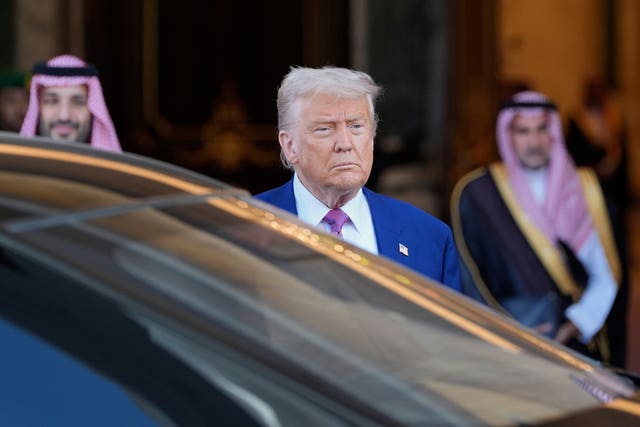
Israel also fears Mr al-Sharaa and his Islamist past could pose a threat on its northern border.
Syrians cheered the announcement by Mr Trump that the US will move to lift sanctions on the beleaguered Middle Eastern nation.
The state-run SANA news agency published video and photographs of Syrians cheering in Umayyad Square, the largest in the country’s capital Damascus.
Others honked their car horns or waved the new Syrian flag in celebration.
People whistled and cheered as fireworks lit the night sky.
A statement from Syria’s Foreign Ministry on Tuesday night called the announcement “a pivotal turning point for the Syrian people as we seek to emerge from a long and painful chapter of war”.
“The removal of these sanctions offers a vital opportunity for Syria to pursue stability, self-sufficiency and meaningful national reconstruction, led by and for the Syrian people,” the statement added.





